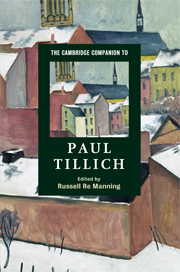Book contents
- Frontmatter
- Part I Standing within the theological circle
- Part II Theology of culture
- Part III Tillich in dialogue
- 14 Tillich in dialogue with natural science
- 15 Tillich in dialogue with psychology
- 16 Tillich in dialogue with Japanese Buddhism: a paradigmatic illustration of his approach to inter-religious conversation
- 17 Tillich and feminism
- 18 Tillich and the postmodern
- Bibliography
- Index
15 - Tillich in dialogue with psychology
from Part III - Tillich in dialogue
Published online by Cambridge University Press: 28 May 2009
- Frontmatter
- Part I Standing within the theological circle
- Part II Theology of culture
- Part III Tillich in dialogue
- 14 Tillich in dialogue with natural science
- 15 Tillich in dialogue with psychology
- 16 Tillich in dialogue with Japanese Buddhism: a paradigmatic illustration of his approach to inter-religious conversation
- 17 Tillich and feminism
- 18 Tillich and the postmodern
- Bibliography
- Index
Summary
Tillich's dialogue with psychology has many faces. It can be understood in the light of his conversations with specific psychologists and their schools. It can be understood in terms of his sustained efforts to establish the legitimate boundaries between religious and psychological healing. Finally, there is the tribute he paid to Carl Jung on the occasion of the latter's death indicative of Tillich's late theological appreciation of and intellectual affinity with Jung's understanding of the human psyche (CGJ, 28-32). Yet there is a dimension to Tillich's relation to psychology that precedes these specifics. It lies in the way his theology itself is infused with a profound psychological sense lending to the foundations of his thought a compelling impact on the psyche of his reader. In his description of existential thinking Tillich refers to Boehme, Schelling, Baader and even Heidegger as philosophers who used 'psychological notions with a non-psychological connotation'. Such thinkers have 'developed an ontology in psychological terms' ('Existential Philosophy: Its Historical Meaning' in TC, 94, 96). Tillich himself stood in this tradition. Tillich's unforced synthesis of ontology and psychology is evident throughout his work. It is, perhaps, most prominent in his understanding of faith as humanity's ultimate concern. Such a conception of concern, in admitted continuity with Schleiermacher's 'feeling of unconditional dependence', becomes for Tillich humanity's universal, religious and psychological experience of alienation from and drive towards its essential nature grounded in the divine (DF, 1-4, 38-40).
- Type
- Chapter
- Information
- The Cambridge Companion to Paul Tillich , pp. 238 - 253Publisher: Cambridge University PressPrint publication year: 2009
- 2
- Cited by



